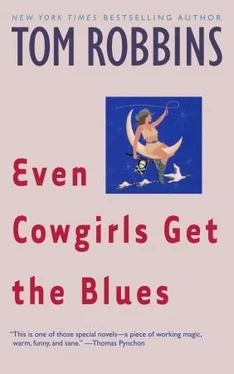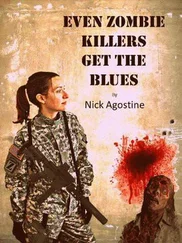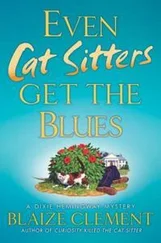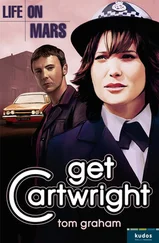The Chink shook his beard in the evening breeze. He was hairy inside and out. His beard sent out shocks of milkweed and mutton. “Yes, ironic, finding women who would be women imitating men. But there are other aspects of this saga that I bet you haven't considered.”
“If you'll tell me, I'll turn you loose.”
“Makes no difference to me. Actually, I was hoping you'd hold on, just in case I yield to this impulse to jump off the cliff.”
She let go.
“Ha ha ho ho and hee hee,” said the Chink. Then he swept his smirk under the rug. “I was merely thinking about the significance of the fact that there are cranes involved in this confrontation between girls and government. The crane is the bird of poetry. It was Robert Graves who pointed out that the crane has been traditionally connected with poetry all the way from China to Ireland. The crane is the national animal, the totem animal of Hungary — and as Graves wrote, there are twenty times more poems written and published in Hungary each year than in any other country. Obviously, cranes bring luck to poets, and vice versa. The only country in Europe where cranes are still breeding is Hungary. The last crane in the British Isles was shot in nineteen six. Russia's cranes are hiding in Siberia. Japan's, too. And we know the state of U.S. cranes. Graves says, 'While there are still cranes in Hungary, poetry is bound to continue.' He's right. And if poetry continues, Hungary will continue. Religion and politics are unnecessary to the culture — or the individual — that has poetry.”
“You really don't believe in political solutions, do you?”
“I believe in political solutions to political problems. But man's primary problems aren't political; they're philosophical. Until humans can solve their philosophical problems, they're condemned to solve their political problems over and over and over again. It's a cruel, repetitious bore.”
Sissy thought she had the old goat this time, and not just by the pecker, either. “Well, then, what are the philosophical solutions?”
“Ha ha ho ho and hee hee. That's for you to find out.” She didn't have him. “I'll say this much and no more: there's got to be poetry. And magic. Your thumbs taught you that much, didn't they? Poetry and magic. At every level. If civilization is ever going to be anything but a grandiose pratfall, anything more than a can of deodorizer in the shithouse of existence, then statesmen are going to have to concern themselves with magic and poetry. Bankers are going to have to concern themselves with magic and poetry. Time magazine is going to have to write about magic and poetry. Factory workers and housewives are going to have to get their lives entangled in magic and poetry. As for policemen and cowgirls. .” The Chink wagged his beard at the ranch below. It was a beard that a nesting crane might enjoy.
If Sissy failed to comprehend completely, at least she no longer felt confused. Through a pinhole in the peace that dropped like the dusk around them, she squeezed one last question. “Do you think such a thing can ever happen?”
“If you understood poetry and magic, you'd know that it doesn't matter.”
The moon rose.
The clockworks struck.
A crane whooped.
She understood.
111A.
POETRY IS NOTHING more than an intensification or illumination of common objects and everyday events until they shine with their singular nature, until we can experience their power, until we can follow their steps in the dance, until we can discern what parts they play in the Great Order of Love. How is this done? By fucking around with syntax.
[Definitions are limiting. Limitations are deadening. To limit oneself is a kind of suicide. To limit another is a kind of murder. To limit poetry is a Hiroshima of the human spirit. DANGER: RADIATION. Unauthorized personnel not allowed on the premises of Chapter 111a.]
112.
BREAKTHROUGHS ON SIWASH RIDGE notwithstanding, there was precious little communication down on the Rubber Rose. All day, attorneys from the ACLU tried to build bridges between the government and the cowgirls, but each bridge was burned before it was crossed.
As their final and most generous offer in a series of overtures, Justice Department spokesmen at last promised that no charges would be filed against the cowgirls were they to withdraw peacefully and allow the Interior Department to take whatever steps it felt necessary for the present well-being and future preservation of the crane flock. As a sort of bonus, the Assistant Undersecretary of the Interior said that if a bird was killed for an autopsy, it would be later mounted and presented to the Rubber Rose Ranch as a symbol of that place's concern for America's vanishing wildlife.
“Just what we've always needed,” snapped Delores del Ruby. “A stuffed whooping crane.”
Yes, Delores was back. And with her return there disappeared any hope for settlement. Many of the pardners, concerned for the safety of themselves and one another, concerned for the birds, concerned, even, for the men at the gates, were growing increasingly willing to accept the government's terms. Bonanza Jellybean herself conceded that the cowgirls had made their point, had made it repeatedly, had made it before a worldwide audience — so there might be little additional to gain by pushing it any further.
Ah, but Delores. A dark shadow of a woman. With nocturnal eyes. And a midnight voice. A smile like a hiss of asps in the rain. It is said that a long ebony hair curled from the nipple of each of her perfectly formed breasts. Delores was adamant.
“It isn't for ourselves that we take this stand,” she said, her voice as heavy and slow as the lids of a crocodile. “It isn't for cowgirls.” She flicked her arrow tongue at Jelly. “It's for all the daughters everywhere. This is an extremely important confrontation. This is woman-kind's chance to prove to her enemy that she's willing to fight and die. If we women don't show here and now that we aren't afraid to fight and die, then our enemy will never take us seriously. Men will always know that, no matter how strong our words and determined our deeds, there's a point where we'll back down and give them their way.”
Cracking her whip to obscure Debbie's gentle protests, Delores paraded proudly before the barricades. “I'm prepared to battle!” she cried. “Furthermore, I'm prepared to win! Victory for every female, living or dead, who's suffered the temporary defeats of masculine insensitivity to their inner lives!”
A few of the cowgirls cheered. Donna said, “I'll fight the bastards.” Big Red was opening a can of beans with a bowie knife. “I'll fight 'em with bean gas, if necessary,” said Big Red.
Delores and her whip shared a grin. Said the forewoman, “The sun's going down. Let's those of us not standing watch get some sleep. In the morning we'll plan our fight. Tomorrow afternoon those of you who'd like can join me in the reeds, where the cranes and I will be sharing the last crumbs left in the peyote sack.”
113.
IF YOU WANT details of the secret White House whooping crane meeting, you'll have to read the exposé Jack Anderson will write as soon as he can get his hands on the tapes. If there were any tapes. Seymour Hersh says the conference wasn't taped; says that, after the taping experiences of the prior President, nothing will ever be taped in the White House again, not a Mantovani concert or an Xmas package or a sprained ankle — and that is why Seymour Hersh plans no in-depth article on the subject. Face it; you may never get the details of the secret White House whooping crane meeting. Are you positive you want them?
The author knows generally what took place in the conference room off the Oval Office that morning in late September, and although he's been warned to keep mum, he is going to divulge it here. It ought to satisfy you. Many small streams empty into these pages. I never promised you the Potomac.
Читать дальше












